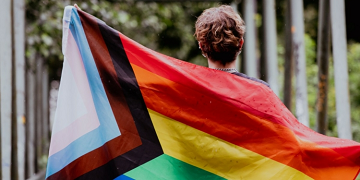Twitter, under Elon Musk’s leadership, has become the riskiest platform for LGBTQ+ individuals. How are other social platforms performing in terms of LGBTQ+ safety?
Key Takeaways:
- GLAAD’s Social Media Safety Index reveals Twitter as the riskiest platform for LGBTQ individuals, with Elon Musk’s acquisition noted as a turning point for the worse.
- While some social media platforms like Meta, TikTok, and YouTube showed safety score improvements, consistent enforcement remains a challenge.
- The debate between unrestricted free speech and user safety is growing, with advocacy organizations warning that absolute freedom could infringe on the rights of marginalized communities.
GLAAD Flags Twitter as the Top Threat to LGBTQ Safety
When it comes to providing a safe environment for LGBTQ individuals, the world of social media is failing spectacularly, but one platform stands out as the riskiest of them all: Twitter. That’s according to the renowned LGBTQ advocacy organization, GLAAD, which shared these unsettling findings during its recent unveiling of the annual Social Media Safety Index.
The Struggle to Protect LGBTQ Users: Social Media’s Lacking Efforts
GLAAD’s comprehensive study paints a grim picture, underlining the inadequate protective measures all major platforms — including Facebook, Instagram, TikTok, YouTube, and notably, Twitter — offer to LGBTQ users against hate speech and harassment. Particularly vulnerable are transgender, non-binary, and gender non-conforming individuals. Despite some minor improvements over the past year, Twitter — now under the ownership of Tesla CEO Elon Musk — has shockingly regressed, earning the tag as “the most dangerous platform for LGBTQ people.”
The elimination of Twitter’s communications staff post-acquisition has led to an automated and rather juvenile response system, represented by a poop emoji. This disregard for communication is emblematic of a larger issue: a seemingly apathetic attitude towards the wave of hate and harassment that LGBTQ users face on the platform.
Real World Impact of Online Hate and Harassment
The intersection of online hate and real-life violence is a reality that LGBTQ advocates have long been warning us about. Beyond the physical danger, relentless online attacks can deeply scar one’s mental health. Sarah Kate Ellis, CEO and President of GLAAD, highlighted the increasing cases of doxxing within the community, indicating the intensity of hate, vitriol, and attacks have reached unprecedented levels.
This surge in attacks on LGBTQ Twitter users coincides with Elon Musk’s takeover of the platform last fall. Advocacy groups attribute this spike in part to the drastic staffing cuts made by Musk, leading to a shortage of content moderators to manage the onslaught of problematic tweets.
A Backslide in Protective Policies and a Rise in Misinformation
April witnessed a silent removal of a policy against “targeted misgendering or deadnaming of transgender individuals” on Twitter. The move sparked concerns about the platform’s growing hostility towards marginalized groups. Concurrently, Musk’s interactions with far-right figures and spread of misinformation to his massive follower base exacerbated the situation.
Twitter also amended its policy response to rule-violating tweets, opting to restrict rather than remove offensive tweets in certain cases. This, in Ellis’s words, has transformed Twitter into a “cesspool” of unproductive and aggressive exchanges.
Competing Platforms: A Comparative Look
While Twitter’s safety standards have worsened, Meta, the parent company of Facebook and Instagram, witnessed a 15 percentage point score increase for both its platforms. Despite the stronger policies, GLAAD highlights inconsistency in enforcement as a key issue.
Likewise, TikTok and Google’s YouTube saw improvements in their scores, with the former stating pride in their stringent policies protecting LGBTQ+ individuals.
The Fine Balance Between Free Speech and Safety
Both Musk and Twitter’s newly appointed CEO, Linda Yaccarino, emphasize the concept of a “digital town square”, advocating for unrestricted free speech. However, GLAAD and other organizations argue that uncontrolled freedom can potentially suppress the voices of marginalized communities, creating a hostile environment rather than fostering free exchange of ideas.
 Sections of this topic
Sections of this topic
















